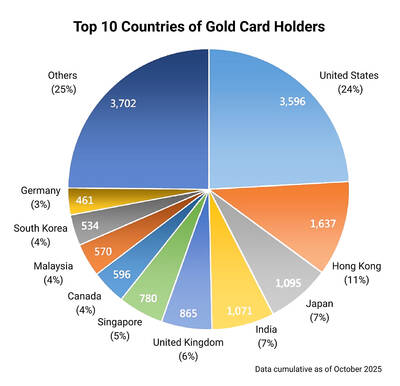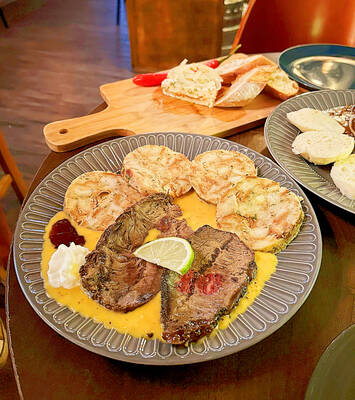▲▲COMPILED BY MARTIN WILLIAMS
Detroit Metal City
We’ve all heard stories of professional musicians who pay their dues performing music they can’t stand. This manga adaptation from Japan takes this predicament to the wackiest level, as a good-natured rural boy with a thing for easy listening finds himself forced to retain the identity of a death metal icon caked with gothic makeup after his titular band DMC hits pay dirt. This feverish metal revisiting of the Mrs Doubtfire theme has had audiences in stitches on both sides of the Pacific. And yes, if the title weren’t already a giveaway, Gene Simmons makes a late appearance.
Suite Dreams
The release of director Koki Mitani’s The Magic Hour two weeks ago allows this handsome, impressive Japanese comedy from three years ago to hit Taiwanese theaters. The scene is a large hotel, the time is New Year’s Eve, and the players are a bunch of powerful and/or eccentric guests and staff. Mitani respects his characters and how they interact, and the result is a wide and detailed canvas of hilarity and drama that has delighted critics and audiences.
700 Days of Battle: Us vs the Police
Another Japanese release, but a polar opposite in terms of sophistication. Based on part of a “hit” blog serial (as measured by Web site hits, presumably), 700 Days proceeds through a litany of comical clashes between some high school friends and a cop. Broad and family-friendly, this is recommended for anyone who thinks youthful rebellion only ends with a pie in the face of authority rather than drug addiction or a debilitating police record.
Memory
With Billy Zane, Dennis Hopper and Ann-Margret in a movie, there should be something for everyone, but the reaction to this little-seen chiller from 2006 was less than generous. Zane is afflicted with “memories” that may or may not have been his own. One would hope not, seeing as they included abducting and killing kids. The response to this potentially horrifying scenario seems to have largely focused on the viability of Zane’s hair and why the market forgot to send it straight to DVD. That forgetfulness now extends to the Taiwanese market.
The Gig
Another promotion for TiVo product makes its way to Taipei’s Baixue theater in Ximending. The shadow of Porky’s looms large as a bunch of Thai college friends set about capturing the girls of their wet dreams by forming a group called “The Gig.” The first rule in associating with women, so the newspaper ad sagely tells us, is “don’t fall in love with the girl you’re banging.” Got that straight? This 2006 release made enough money to get a sequel filmed the following year. Starts tomorrow.

Seven hundred job applications. One interview. Marco Mascaro arrived in Taiwan last year with a PhD in engineering physics and years of experience at a European research center. He thought his Gold Card would guarantee him a foothold in Taiwan’s job market. “It’s marketed as if Taiwan really needs you,” the 33-year-old Italian says. “The reality is that companies here don’t really need us.” The Employment Gold Card was designed to fix Taiwan’s labor shortage by offering foreign professionals a combined resident visa and open work permit valid for three years. But for many, like Mascaro, the welcome mat ends at the door. A

The Western media once again enthusiastically forwarded Beijing’s talking points on Japanese Prime Minister Sanae Takaichi’s comment two weeks ago that an attack by the People’s Republic of China (PRC) on Taiwan was an existential threat to Japan and would trigger Japanese military intervention in defense of Taiwan. The predictable reach for clickbait meant that a string of teachable moments was lost, “like tears in the rain.” Again. The Economist led the way, assigning the blame to the victim. “Takaichi Sanae was bound to rile China sooner rather than later,” the magazine asserted. It then explained: “Japan’s new prime minister is

NOV. 24 to NOV. 30 It wasn’t famine, disaster or war that drove the people of Soansai to flee their homeland, but a blanket-stealing demon. At least that’s how Poan Yu-pie (潘有秘), a resident of the Indigenous settlement of Kipatauw in what is today Taipei’s Beitou District (北投), told it to Japanese anthropologist Kanori Ino in 1897. Unable to sleep out of fear, the villagers built a raft large enough to fit everyone and set sail. They drifted for days before arriving at what is now Shenao Port (深奧) on Taiwan’s north coast,

Divadlo feels like your warm neighborhood slice of home — even if you’ve only ever spent a few days in Prague, like myself. A projector is screening retro animations by Czech director Karel Zeman, the shelves are lined with books and vinyl, and the owner will sit with you to share stories over a glass of pear brandy. The food is also fantastic, not just a new cultural experience but filled with nostalgia, recipes from home and laden with soul-warming carbs, perfect as the weather turns chilly. A Prague native, Kaio Picha has been in Taipei for 13 years and